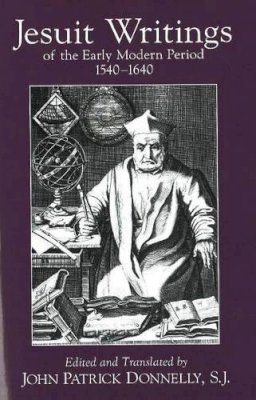24%OFF
Stock image for illustration purposes only - book cover, edition or condition may vary.
Jesuit Writings of the Early Modern Period
Donnelly John
FREE Delivery in Ireland
Description for Jesuit Writings of the Early Modern Period
Paperback. A collection of sources in translation. It is suitable for use in courses on the Counter-Reformation, on the history of the Jesuit order, or as part of a more general course on the history of Christianity in the early modern period. Num Pages: 288 pages, Illustrations, map. BIC Classification: HRCC7. Category: (G) General (US: Trade). Dimension: 214 x 141 x 15. Weight in Grams: 352.
Of the many Catholic religious orders established in the wake of the Protestant Reformation, none was as influential--or as controversial--as the Society of Jesus, better known as the Jesuit Order. Beginning with key selections from Ignatius of Loyola's Autobiography and Spiritual Exercises, the documents collected here show how the Order grew, in its first hundred years, from a handful of companions to an international organization praised by friends for its missionary, educational, and scholarly achievements--and reviled by enemies for its influence on church and state affairs throughout the world. Headnotes to the selections provide historical, religious, and political context; footnotes ... Read moreidentify proper names, historical events, and literary allusions, and offer suggestions for further reading. A map, an index, and eighteen illustrations are also included.
Show Less
Product Details
Publisher
Hackett Publishing Co, Inc United States
Place of Publication
Cambridge, MA, United States
Shipping Time
Usually ships in 5 to 9 working days
About Donnelly John
John Patrick Donnelly, S. J. is Professor of History, Marquette University.
Reviews for Jesuit Writings of the Early Modern Period
Donnelly's collection makes some key primary source material easily available to undergraduates and others with little background in Jesuit history. . . . There is a healthy balance between theological treatises, administrative decrees, narrative histories, polemical attacks, and even scenes from a Jesuit-authored play. . . . In sum, this is a useful collection of sources for undergraduate courses in ... Read morethe history of Christianity or the history of early modern Europe.
Christopher Carlsmith, Theological Studies This book is a valuable contribution to the study of both the Society of Jesus and Early Modern Europe. To scholars of the period, it offers a collection of useful texts that fully account for all the dimensions of the characteristic Jesuit 'way of proceding.' In particular, I appreciate that Donnelly has resisted the tendency to plough over old ground (those Jesuit sources that have been repeatedly edited and translated by contemporary historians) and has chosen instead to offer selections from the wealth of material collected, edited, and published in their original languages by the Jesuits themselves. By dipping under the surface of such Jesuit texts as Ignatius's Autobiography, the Spiritual Exercises, and the Relations, collating good existing translations (including those drawn from his own works) and offering new translations where necessary, he has done an invaluable service, especially students daunted by the Latin of most of the original sources. I will certainly use this book in my classes
and I hope that more is coming!
Benjamin Westervelt, Lewis and Clark College Drawing on varied sources
diaries, chronicles, letters, canons, reports, plays, constitutions, treatises and essays
Fr. John Patrick Donnelly presents the mosaic of the first century of the Jesuits, detailing their vision, formation, struggles, aspirations, and impact on early modern society. The book has several notable features that make it profitable on a number of levels to students of the history of the Church, the Reformation, the Catholic Reformation, and of course the Jesuits themselves. As a whole this is an excellent collection whose range serves a number of demands....the selections are uniformly informative and lively, and as such easily comprehended.
Gary W. Jenkins, Eastern University Show Less

